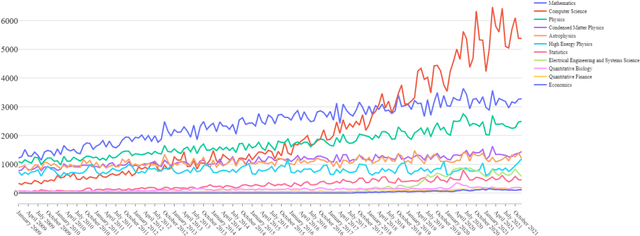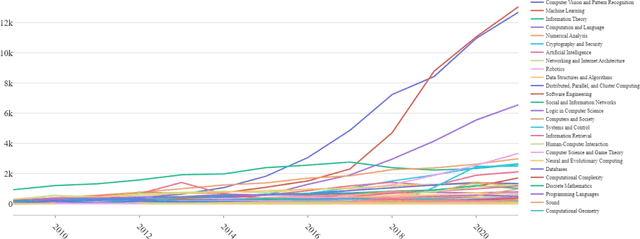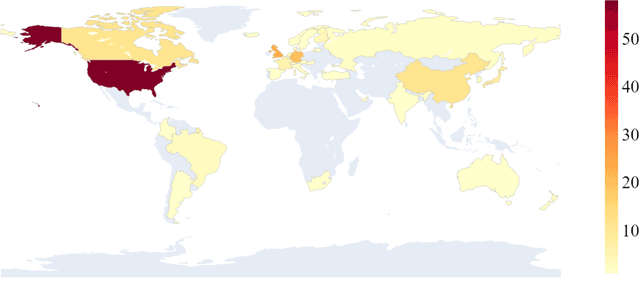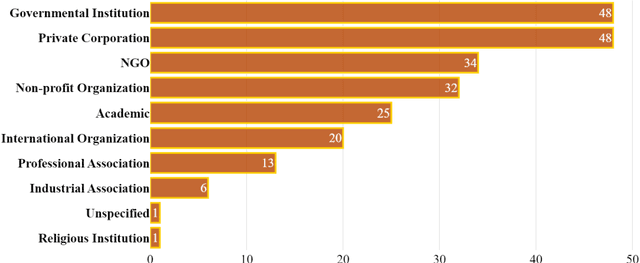Nicholas Kluge Corrêa
Superalignment with Dynamic Human Values
Mar 17, 2025Abstract:Two core challenges of alignment are 1) scalable oversight and 2) accounting for the dynamic nature of human values. While solutions like recursive reward modeling address 1), they do not simultaneously account for 2). We sketch a roadmap for a novel algorithmic framework that trains a superhuman reasoning model to decompose complex tasks into subtasks that are still amenable to human-level guidance. Our approach relies on what we call the part-to-complete generalization hypothesis, which states that the alignment of subtask solutions generalizes to the alignment of complete solutions. We advocate for the need to measure this generalization and propose ways to improve it in the future.
Tucano: Advancing Neural Text Generation for Portuguese
Nov 12, 2024Abstract:Significant advances have been made in natural language processing in recent years. However, our current deep learning approach to language modeling requires substantial resources in terms of data and computation. One of the side effects of this data-hungry paradigm is the current schism between languages, separating those considered high-resource, where most of the development happens and resources are available, and the low-resource ones, which struggle to attain the same level of performance and autonomy. This study aims to introduce a new set of resources to stimulate the future development of neural text generation in Portuguese. In this work, we document the development of GigaVerbo, a concatenation of deduplicated Portuguese text corpora amounting to 200 billion tokens. Via this corpus, we trained a series of decoder-transformers named Tucano. Our models perform equal or superior to other Portuguese and multilingual language models of similar size in several Portuguese benchmarks. The evaluation of our models also reveals that model performance on many currently available benchmarks used by the Portuguese NLP community has little to no correlation with the scaling of token ingestion during training, highlighting the limitations of such evaluations when it comes to the assessment of Portuguese generative language models. All derivatives of our study are openly released on GitHub and Hugging Face. See https://nkluge-correa.github.io/Tucano/
Dynamic Normativity: Necessary and Sufficient Conditions for Value Alignment
Jun 18, 2024Abstract:The critical inquiry pervading the realm of Philosophy, and perhaps extending its influence across all Humanities disciplines, revolves around the intricacies of morality and normativity. Surprisingly, in recent years, this thematic thread has woven its way into an unexpected domain, one not conventionally associated with pondering "what ought to be": the field of artificial intelligence (AI) research. Central to morality and AI, we find "alignment", a problem related to the challenges of expressing human goals and values in a manner that artificial systems can follow without leading to unwanted adversarial effects. More explicitly and with our current paradigm of AI development in mind, we can think of alignment as teaching human values to non-anthropomorphic entities trained through opaque, gradient-based learning techniques. This work addresses alignment as a technical-philosophical problem that requires solid philosophical foundations and practical implementations that bring normative theory to AI system development. To accomplish this, we propose two sets of necessary and sufficient conditions that, we argue, should be considered in any alignment process. While necessary conditions serve as metaphysical and metaethical roots that pertain to the permissibility of alignment, sufficient conditions establish a blueprint for aligning AI systems under a learning-based paradigm. After laying such foundations, we present implementations of this approach by using state-of-the-art techniques and methods for aligning general-purpose language systems. We call this framework Dynamic Normativity. Its central thesis is that any alignment process under a learning paradigm that cannot fulfill its necessary and sufficient conditions will fail in producing aligned systems.
TeenyTinyLlama: open-source tiny language models trained in Brazilian Portuguese
Jan 30, 2024Abstract:Large language models (LLMs) have significantly advanced natural language processing, but their progress has yet to be equal across languages. While most LLMs are trained in high-resource languages like English, multilingual models generally underperform monolingual ones. Additionally, aspects of their multilingual foundation sometimes restrict the byproducts they produce, like computational demands and licensing regimes. In this study, we document the development of open-foundation models tailored for use in low-resource settings, their limitations, and their benefits. This is the TeenyTinyLlama pair: two compact models for Brazilian Portuguese text generation. We release them under the permissive Apache 2.0 license on GitHub and Hugging Face for community use and further development. See https://github.com/Nkluge-correa/TeenyTinyLlama
On the Efficiency of Ethics as a Governing Tool for Artificial Intelligence
Oct 27, 2022Abstract:The 4th Industrial Revolution is the culmination of the digital age. Nowadays, technologies such as robotics, nanotechnology, genetics, and artificial intelligence promise to transform our world and the way we live. Artificial Intelligence Ethics and Safety is an emerging research field that has been gaining popularity in recent years. Several private, public and non-governmental organizations have published guidelines proposing ethical principles for regulating the use and development of autonomous intelligent systems. Meta-analyses of the AI Ethics research field point to convergence on certain principles that supposedly govern the AI industry. However, little is known about the effectiveness of this form of Ethics. In this paper, we would like to conduct a critical analysis of the current state of AI Ethics and suggest that this form of governance based on principled ethical guidelines is not sufficient to norm the AI industry and its developers. We believe that drastic changes are necessary, both in the training processes of professionals in the fields related to the development of software and intelligent systems and in the increased regulation of these professionals and their industry. To this end, we suggest that law should benefit from recent contributions from bioethics, to make the contributions of AI ethics to governance explicit in legal terms.
Worldwide AI Ethics: a review of 200 guidelines and recommendations for AI governance
Jun 27, 2022



Abstract:In the last decade, a great number of organizations have produced documents intended to standardize, in the normative sense, and promote guidance to our recent and rapid AI development. However, the full content and divergence of ideas presented in these documents have not yet been analyzed, except for a few meta-analyses and critical reviews of the field. In this work, we seek to expand on the work done by past researchers and create a tool for better data visualization of the contents and nature of these documents. We also provide our critical analysis of the results acquired by the application of our tool into a sample size of 200 documents.
Artificial Intelligence Ethics and Safety: practical tools for creating "good" models
Dec 14, 2021Abstract:The AI Robotics Ethics Society (AIRES) is a non-profit organization founded in 2018 by Aaron Hui to promote awareness and the importance of ethical implementation and regulation of AI. AIRES is now an organization with chapters at universities such as UCLA (Los Angeles), USC (University of Southern California), Caltech (California Institute of Technology), Stanford University, Cornell University, Brown University, and the Pontifical Catholic University of Rio Grande do Sul (Brazil). AIRES at PUCRS is the first international chapter of AIRES, and as such, we are committed to promoting and enhancing the AIRES Mission. Our mission is to focus on educating the AI leaders of tomorrow in ethical principles to ensure that AI is created ethically and responsibly. As there are still few proposals for how we should implement ethical principles and normative guidelines in the practice of AI system development, the goal of this work is to try to bridge this gap between discourse and praxis. Between abstract principles and technical implementation. In this work, we seek to introduce the reader to the topic of AI Ethics and Safety. At the same time, we present several tools to help developers of intelligent systems develop "good" models. This work is a developing guide published in English and Portuguese. Contributions and suggestions are welcome.
Modelos dinâmicos aplicados à aprendizagem de valores em inteligência artificial
Jul 30, 2020Abstract:Experts in Artificial Intelligence (AI) development predict that advances in the development of intelligent systems and agents will reshape vital areas in our society. Nevertheless, if such an advance is not made prudently and critically, reflexively, it can result in negative outcomes for humanity. For this reason, several researchers in the area have developed a robust, beneficial, and safe concept of AI for the preservation of humanity and the environment. Currently, several of the open problems in the field of AI research arise from the difficulty of avoiding unwanted behaviors of intelligent agents and systems, and at the same time specifying what we really want such systems to do, especially when we look for the possibility of intelligent agents acting in several domains over the long term. It is of utmost importance that artificial intelligent agents have their values aligned with human values, given the fact that we cannot expect an AI to develop human moral values simply because of its intelligence, as discussed in the Orthogonality Thesis. Perhaps this difficulty comes from the way we are addressing the problem of expressing objectives, values, and ends, using representational cognitive methods. A solution to this problem would be the dynamic approach proposed by Dreyfus, whose phenomenological philosophy shows that the human experience of being-in-the-world in several aspects is not well represented by the symbolic or connectionist cognitive method, especially in regards to the question of learning values. A possible approach to this problem would be to use theoretical models such as SED (situated embodied dynamics) to address the values learning problem in AI.
* in Portuguese
The Automation of Acceleration: AI and the Future of Society
Jul 12, 2020Abstract:The Acceleration Thesis studies the phenomenon of social acceleration in its different aspects, something that has been occurring since the beginnings of civilization, and is one of the topics of debate in contemporary Critical Theory. When we find ourselves in a society immersed in a capitalist model, where the means of production are pressured to produce more and more to supply a market characterized by consumerism, acceleration induces an increase in the speed of production that exceeds the physical and cognitive capacities of human beings. An obvious solution to such demand is automation. The automation of the means of production occurred in several stages, as in the industrial revolutions, previously we can say that it was our physical capacities that were surpassed. However, in the middle of the 4th Industrial Revolution, with the massive use of technologies such as Artificial Intelligence (AI) is our cognitive capacitie that is being continuously surpassed. Thus, new questions about the benefits and risks of the use of such technologies are being debated, mainly in the area of machine ethics, which will be the focus of our study. In this article we present a review of several points, the risks and benefits of social modernization through AI, how human society has been preparing to deal with such changes, and finally, how the debate on such technologies is taking place in a way totally dominated by European and North American societies. We believe it is necessary to make the debate about the technologies that will shape the future of global society more democratic and inclusive, so that our preferences are more homogeneous and less biased.
Dynamic Models Applied to Value Learning in Artificial Intelligence
May 12, 2020Abstract:Experts in Artificial Intelligence (AI) development predict that advances in the development of intelligent systems and agents will reshape vital areas in our society. Nevertheless, if such an advance is not made prudently and critically-reflexively, it can result in negative outcomes for humanity. For this reason, several researchers in the area are trying to developed a robust, beneficial, and safe concept of AI for the preservation of humanity and the environment. Currently, several of the open problems in the field of AI research arise from the difficulty of avoiding unwanted behaviors of intelligent agents and systems, and at the same time specifying what we really want such systems to do, especially when we look for the possibility of intelligent agents acting in several domains over the long term. It is of utmost importance that artificial intelligent agents have their values aligned with human values, given the fact that we cannot expect an AI to develop human moral values simply because of its intelligence, as discussed in the Orthogonality Thesis. Perhaps this difficulty comes from the way we are addressing the problem of expressing objectives, values, and ends, using representational cognitive methods. A solution to this problem would be the dynamic approach proposed by Dreyfus, whose phenomenological philosophy shows that the human experience of being-in-the-world in several aspects is not well represented by the symbolic or connectionist cognitive method, especially in regards to the question of learning values. A possible approach to this problem would be to use theoretical models such as SED (situated embodied dynamics) to address the values learning problem in AI.
 Add to Chrome
Add to Chrome Add to Firefox
Add to Firefox Add to Edge
Add to Edge